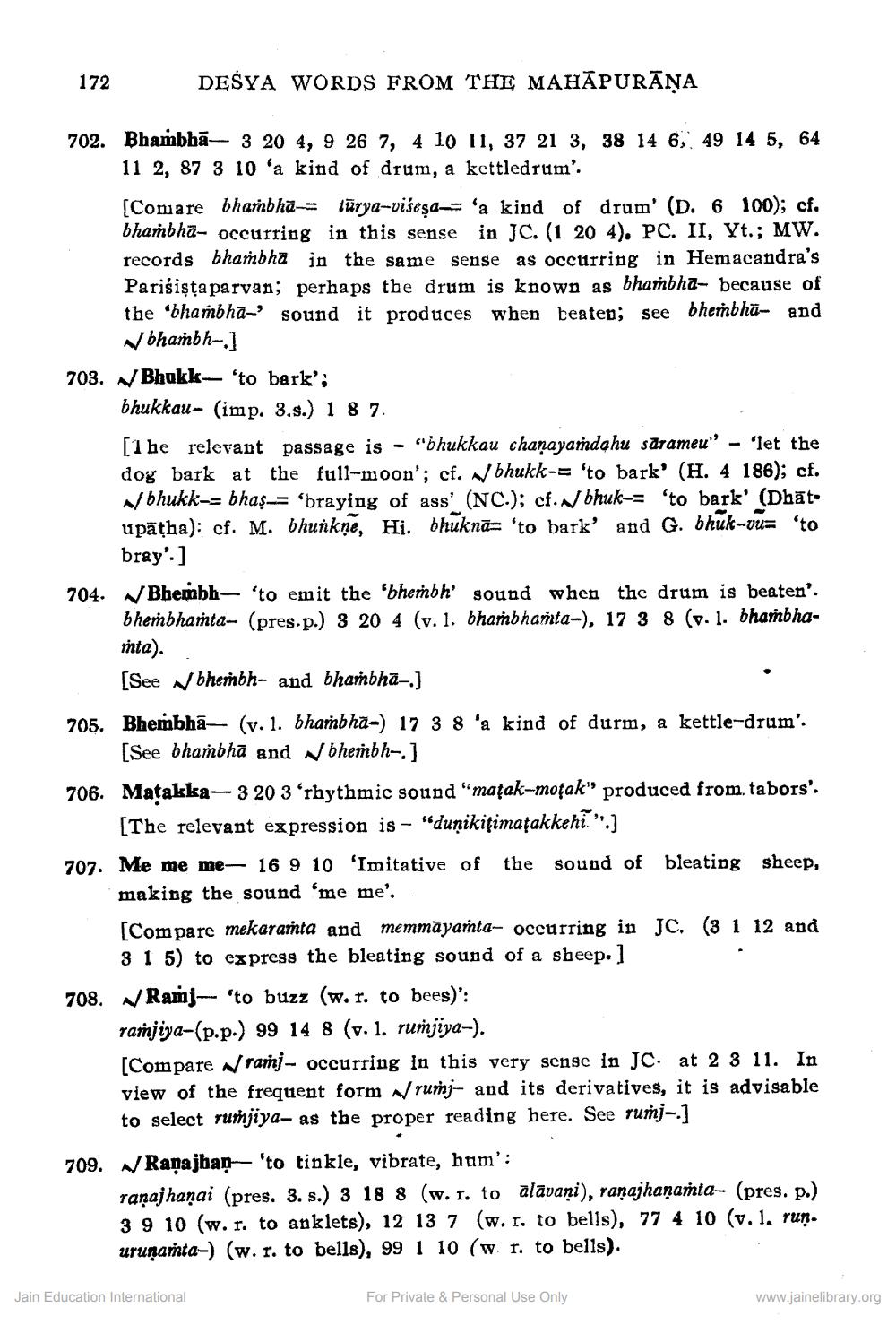________________
172
DEŠYA WORDS FROM THE MAHĀPURĀŅA
702. Bhambhā- 3 20 4, 9 26 7, 4 10 11, 37 21 3, 38 14 6, 49 14 5, 64
11 2, 87 3 10 'a kind of drum, a kettledrum'. [Comare bharbha-- türya-visesa- 'a kind of drum' (D. 6 100); cf. bhambha- occurring in this sense in JC. (1 20 4). PC. II. Yt.: MW. records bhambha in the same sense as occurring in Hemacandra's Parisista parvan; perhaps the drum is known as bhambha- because of the 'bhambha~' sound it produces when beaten; see bhenbhā- and
bhambh-] 703. Bhukk- 'to bark';
bhukkau- (imp. 3.s.) 1 87.
(1 he relevant passage is - "bhukkau chanayamdahu sdrameu"' - 'let the dog bark at the full-moon'; cf. bhukk-= 'to bark' (H. 4 186); cf.
bhukk-- bhas-= 'braying of ass' (NC.); cf. bhuk-= 'to bark' (Dhāt. upätha): cf. M. bhunkņe, Hi. bhuknā= 'to bark' and G. bhuk-vu= 'to bray': ]
Bhembh- 'to emit the 'bhembh' sound when the drum is beaten'. bhebhamta- (pres.p.) 3 20 4 (v. l. bhambharta-), 17 3 8 (v. 1. bhambhamta). [See » bhebh- and bhambha-.]
704.
705. Bhembhā— (v. 1. bhambha-) 17 3 8 'a kind of durm, a kettle-drum'.
[See bhambhā and bhembh-. ] 706. Matakka-- 3 20 3 ‘rhythmic sound "matak-motak" produced from. tabors'.
[The relevant expression is - "duņikitimaţakkehi”.] 707. Me me me- 16 9 10 'Imitative of the sound of bleating sheep,
making the sound 'me me'. [Compare mekaramta and memmāyamta- occurring in JC. (3 1 12 and
3 1 5) to express the bleating sound of a sheep. ] 708. Ramj- 'to buzz (w. r. to bees)':
ramjiya-(p.p.) 99 14 8 (v. 1. ruńjiya-). [Compare wram- occurring in this very sense in JC. at 2 3 11. In view of the frequent form » rumj- and its derivatives, it is advisable to select ruńjiya, as the proper reading here. See run-]
709.
Raňajban- 'to tinkle, vibrate, hum': ranaj hanai (pres. 3. s.) 3 18 8 (w. 1. to alavani), ranajhanamta- (pres.p.) 3 9 10 (w.r. to anklets), 12 13 7 (w. r. to bells), 77 4 10 (v. 1. run. urunamta-) (w. r. to bells), 99 1 10 (w r. to bells).
Jain Education International
For Private & Personal Use Only
www.jainelibrary.org




